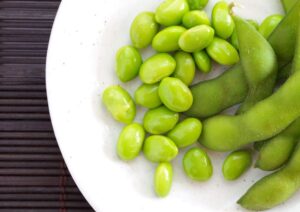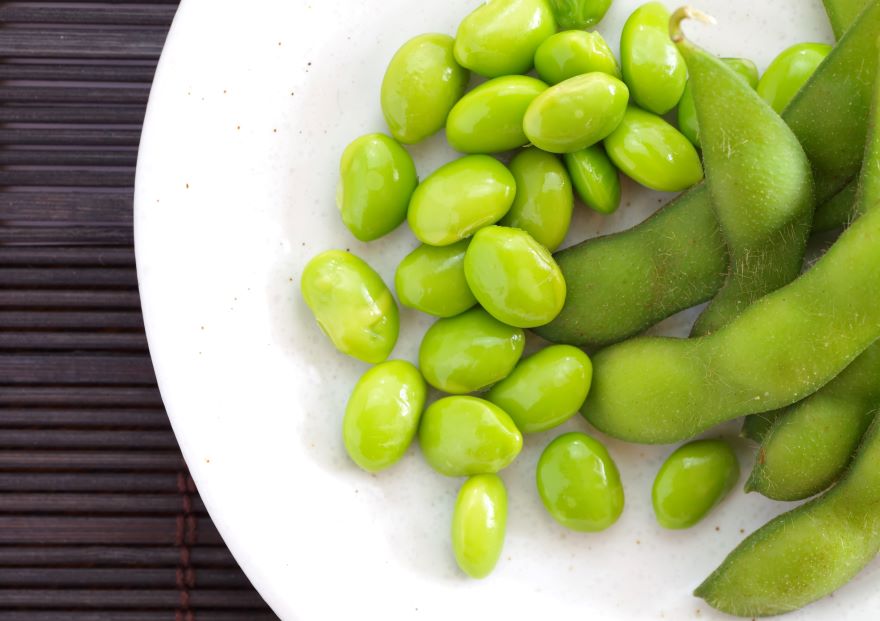When considering the keto diet, finding foods that fit into the low-carb, high-fat criteria is crucial. Edamame, known for its health benefits, including a good dose of protein and fiber, often comes into question. While traditionally part of East Asian cuisine, these immature soybeans have found their way onto plates worldwide. Determining whether edamame is keto-friendly or not hinges on understanding its carbohydrate content relative to the strict daily limits of a standard ketogenic diet.

Despite being classified as a legume—a group of foods typically limited on the keto diet due to their higher carb content—edamame presents a unique case. Its nutritional profile, especially when it comes to net carbs (total carbs minus fiber), may offer some flexibility for those following a keto lifestyle. One must balance edamame inclusion in their diet with the ketogenic goal of staying in ketosis, where the body burns fat for fuel instead of glucose.
Key Takeaways
- Edamame, rich in protein and fiber, poses a unique consideration for keto dieters.
- Its net carb content may make moderate consumption compatible with a ketogenic diet.
- Maintaining a state of ketosis while incorporating edamame requires careful dietary planning.
Understanding the Keto Diet and Nutritional Goals
The ketogenic, or keto, diet is a high-fat, adequate-protein, and low-carbohydrate eating plan designed to put the body into a metabolic state called ketosis. Drastically reducing carb intake and increasing fat consumption shifts the body from using glucose to burning stored fats for energy.
This diet focuses on net carbs, calculated by subtracting fiber grams from the total carbohydrate grams. Keeping the net carb intake to typically between 20-50 grams per day is crucial for maintaining ketosis. Here, dietary fibers are not only beneficial for digestive health but also assist in staying within the net carb goals as they are non-digestible and thus not counted toward daily carbohydrate limits.
On a keto diet, moderate protein intake maintains muscle mass, but overconsumption can lead to excess protein converting to glucose, potentially pushing the body out of ketosis.
Fat makes up the majority of the diet, providing energy and helping the body absorb essential vitamins. Generally, emphasize quality fat sources like avocados, nuts, and seeds.
Understanding the balance between these macronutrients is essential for achieving and maintaining ketosis for potential benefits such as weight loss and improved metabolic markers. Existing research, such as studies on The Ketogenic Diet and Cardiovascular Diseases, is delving into how these dietary changes could influence long-term health outcomes.
By aligning daily food choices with these keto guidelines—focusing on fats, adequate protein, and minimal carbs—the body becomes more efficient at burning fat for energy, which is the cornerstone of the ketogenic diet.
Health Benefits of Edamame
Edamame offers a treasure trove of nutrients critical for maintaining good health. These green soybeans are a smart choice for anyone looking for a wholesome snack or addition to their meal.
Rich in Vitamins and Minerals
Edamame is an excellent source of essential vitamins and minerals such as vitamin K, which is important for bone health, and iron, which is crucial for blood formation. They also contain a notable amount of vitamin C and calcium, both essential for a healthy immune system and strong bones, respectively. Antioxidants are abundant in these beans, offering protection against oxidative stress.
Fiber for Digestive Health
Each serving of edamame packs fiber, aiding digestion and helping to maintain regular bowel movements. The fiber found in edamame also contributes to a feeling of fullness, which can help with weight management.
Plant-Based Protein Source
Edamame stands out as a plant-based protein source, making it an excellent choice for vegetarians and vegans alike. The protein in edamame includes all nine essential amino acids, making it a complete protein that supports muscle repair and growth. For people on a keto diet, edamame can be particularly valuable due to its low net carb content and plant-based protein. Additionally, these soybeans provide omega-3 fatty acids, which are beneficial fats that support heart health.
Edamame within a Keto Framework
When considering edamame for a ketogenic diet, it’s crucial to assess its net carb content and compare it to other common legumes to understand its potential impact on maintaining ketosis.
Net Carb Content and Keto Impact
Edamame, or young soybeans, often carry a carb count considered borderline for a keto diet. Specifically, edamame contains a lower net carb load compared to many other legumes due to its higher dietary fiber content. For instance, a serving of edamame can provide about 5 grams of net carbs, which could fit within the rigid carb limitations of keto if carefully accounted for within a daily carb count.
This legume has a relatively low glycemic index, meaning it’s less likely to spike blood sugar levels—a crucial factor for sustaining ketosis. The fiber in edamame can also support a healthy digestive system, which is a positive sidebar for those on a ketogenic diet, although keto adherents need to keep tabs on overall carbohydrate intake.
Comparing Edamame to Other Legumes
In comparison to other members of the legume family such as chickpeas and black beans, edamame is more keto-friendly. Where legumes like chickpeas can contain as much as 45 grams of net carbs per cup, making them a less viable option for maintaining ketosis, edamame stands out as a lower-carb alternative. However, even with its keto-friendlier profile, edamame should be consumed in moderation within a keto diet to avoid exceeding the typical carb limit that would hinder ketosis.
Readers interested in the neurological benefits of keto diets and the scientific research behind them can find more details in studies like those found in the treatment of neurological diseases.
Recipes and Preparation of Keto-Friendly Edamame Dishes
Integrating edamame into a ketogenic diet can be both enjoyable and nutritious. Here are some specific ways to prepare and enjoy edamame that fit within the low-carb framework of a keto lifestyle.
Creative Snack Ideas
Snacking on edamame beans can be a delightful experience, especially when you get inventive with preparation. For a simple snack, try steamed edamame pods lightly seasoned with sea salt. If I’m looking for something a bit more indulgent, roasting edamame with a drizzle of olive oil and a sprinkle of parmesan can make a delicious, crispy snack. Boiled edamame tossed in a keto-friendly sauce adds variety to my snack routine.
Another favourite of mine is transforming these beans into a creamy edamame hummus. I blend thawed, frozen edamame with garlic, tahini, and a squeeze of lemon for a low-carb dip that pairs well with veggies.
Incorporating Edamame in Meals
Edamame beans bring both nutrition and color to meals. One of my go-to recipes is a vibrant edamame salad, where I include a mix of leafy greens, other low-carb veggies, and a handful of edamame for added texture and protein.
For a warm entree, I enjoy adding edamame to stir-fries. A dash of soy sauce or tamari, along with ginger and garlic, can create a savory dish that doesn’t compromise my state of ketosis. Preparing a batch of edamame to add to meals throughout the week is a time-saver, and it ensures I have a quick protein source available.
Navigating Contraindications and Myths

In examining the place of edamame in various diets, especially keto, it’s imperative to dispel prevalent myths and assess potential health implications. My aim is to provide a clear understanding of how edamame fits into a ketogenic lifestyle, and what considerations should be taken into account due to its unique nutritional profile.
Addressing Common Keto Myths
Myth: All legumes are off-limits on keto.
Truth: Legumes are often avoided on a strict keto diet due to their carbohydrate content. However, edamame, which are immature soybeans, contain lower net carbs and can sometimes be incorporated in moderation into a keto diet. It’s important to remember the key is to maintain the restrictive carb limit of the diet.
Myth: Keto is exclusively a meat-based diet.
Truth: Keto focuses on high-fat, moderate-protein, and low-carb foods, which means there is room for plant-based proteins. This makes edamame a valuable addition for vegetarian or vegan ketogenic dieters looking for diversity in their protein sources.
Potential Health Concerns
Edamame, rich in phytoestrogens, has come under scrutiny for potential associations with hormonal imbalances and prostate cancer. However, research indicates the link to be inconclusive and often contradicts the claim that edamame’s phytoestrogens significantly impact human hormone levels.
Concerns about heart disease and cardiovascular disease are also prevalent. Contrary to these fears, edamame has been found to support heart health due to its fiber, omega-3 fatty acids, and minimal saturated fat content. As with any diet, moderation and variety are key to mitigating health concerns, including those related to inflammation and autoimmune disease.
Edamame’s Place in Different Diets
Edamame can be a nutritious addition not only to keto but also to vegetarian and vegan diets, offering a source of protein and essential nutrients. Within the context of a keto diet, it’s a point of contention due to its carb content. However, when planning meals and total daily carb intake, edamame can still fit the macros within the flexibility of a less restrictive keto approach.
For those concerned with mental well-being, foods like edamame might play a role in alleviating symptoms of depression due to its magnesium and folate content, which are necessary for neurotransmitter function. Overall, while soybeans and their derivatives might be contentious, edamame’s nutritional benefits are worth considering in a balanced diet.
Frequently Asked Questions
In this section, I’ll address common inquiries about the compatibility of edamame with the ketogenic diet, providing clarity on its nutritional profile and suitable alternatives.
What types of beans are considered keto-friendly?
Beans are typically limited on a ketogenic diet due to their high carbohydrate content. However, some beans like black soybeans and green beans can be more compatible with keto in moderation due to their lower net carb counts.
Can edamame be incorporated into a ketogenic diet plan?
Yes, edamame can be incorporated into a ketogenic diet as it contains fewer net carbs compared to most other legumes, making it a potentially suitable choice for those on a keto diet seeking to maintain ketosis.
How does the carbohydrate content in edamame compare to other keto snacks?
Edamame’s carbohydrate content is relatively low, especially when considering its dietary fiber, which lowers the net carbs. This can make edamame more keto-friendly compared to other snacks that have higher net carbs and less fiber.
What alternatives to edamame are available for those following a strict keto diet?
For those adhering to a stricter keto regimen, alternatives like macadamia nuts or avocado slices may be preferable due to their higher fat content and lower net carb values than edamame.
How does the fiber in edamame impact its net carb count for keto?
The fiber in edamame is significant. It permits a lower net carb count since dietary fiber is subtracted from total carbs to calculate net carbs. Thus, edamame’s net carb count could be supportive of maintaining ketosis for some individuals.
What are the implications of consuming tofu or soy products on ketosis?
Tofu and some soy products can be integrated into a ketogenic diet, but you must monitor portion sizes and the overall carb content. Firm tofu, like edamame, is often low enough in carbs to fit within keto guidelines when you eat it in appropriate amounts.

*We may earn a commission for purchases made using our links. Please see our disclosure to learn more.



